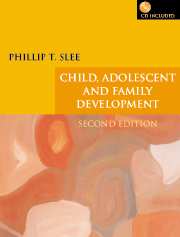Book contents
- Frontmatter
- Contents
- List of Trends and issues
- List of Family life-cycles
- List of Figures and Tables
- Note to the Student
- Note to the Instructor
- How to use the CD-ROM
- Acknowledgements
- Introduction
- Part 1 The Study of Human Development
- 1 Seeing Children in Context
- 2 Concepts of Development
- 3 Theoretical Foundations of Child Development
- Part 2 Conception and Birth
- Part 3 Infancy
- Part 4 Toddlerhood
- Part 5 The Pre-school Years
- Part 6 Middle Childhood
- Part 7 Adolescence
- Part 8 Studying Human Development
- Glossary
- References
- Index
- STUDENT FEEDBACK FORM
3 - Theoretical Foundations of Child Development
from Part 1 - The Study of Human Development
- Frontmatter
- Contents
- List of Trends and issues
- List of Family life-cycles
- List of Figures and Tables
- Note to the Student
- Note to the Instructor
- How to use the CD-ROM
- Acknowledgements
- Introduction
- Part 1 The Study of Human Development
- 1 Seeing Children in Context
- 2 Concepts of Development
- 3 Theoretical Foundations of Child Development
- Part 2 Conception and Birth
- Part 3 Infancy
- Part 4 Toddlerhood
- Part 5 The Pre-school Years
- Part 6 Middle Childhood
- Part 7 Adolescence
- Part 8 Studying Human Development
- Glossary
- References
- Index
- STUDENT FEEDBACK FORM
Summary
‘…Such a Pleasant Temper’
‘You can't think how glad I am to see you again, you dear old thing!’ said the Duchess, as she tucked her arm affectionately into Alice's, and they walked off together. Alice was very glad to find her in such a pleasant temper, and thought to herself that perhaps it was only the pepper that had made her so savage when they met in the kitchen.
Lewis Carroll, Through the Looking GlassKEY TERMS AND CONCEPTS
Psychoanalysis
Id
Ego
Superego
Erogenous zones
Classical conditioning
Operant conditioning
Reinforcement
Punishment
Humanism
Existentialism
Phenomenology
Self-actualisation
Sensori-motor period
Pre-operational period
Concrete operations period
Formal operations period
constructivism
Introduction
This chapter will consider a number of the major theories listed in Figure 1.1 (see chapter 1), including psychoanalytic, psychosocial, behavioural, humanistic, cognitive–developmental and social systems theory. In this second edition, additional information is provided regarding evolutionary, ecological and dynamic systems theory. In discussing the various theories, the work of key writers and researchers will be examined, namely Sigmund Freud, Erik Erikson, Ivan Pavlov, Burrhus Skinner, John Watson, Albert Bandura, Abraham Maslow, Jean Piaget, Eleanor Maccoby and Gregory Bateson. The third item in The Family Life-cycle series introduces the concept of family life-cycle.
- Type
- Chapter
- Information
- Child, Adolescent and Family Development , pp. 47 - 78Publisher: Cambridge University PressPrint publication year: 2002



